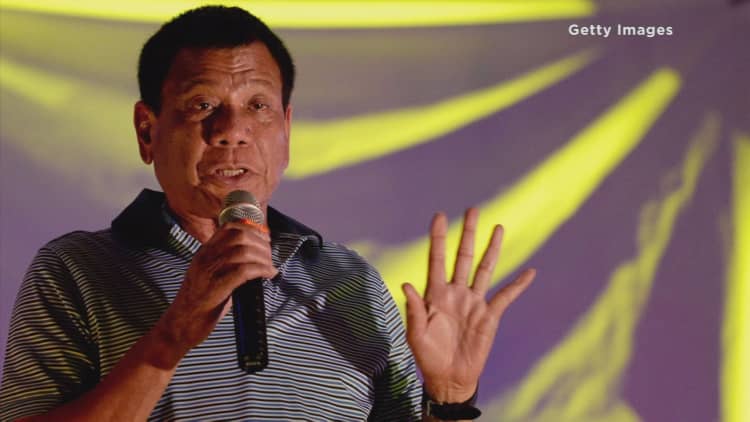
In the five weeks since inauguration, Philippine President Rodrigo Duterte's brash ways have consistently made headlines, both at home and abroad. This month alone, the leader—nicknamed Duterte Harry and The Punisher—has threatened the mining sector with mass closures, vowed to "destroy oligarchs," and insulted the U.S. ambassador to the country.
These moves, however unorthodox for a head of state, are reflective of Duterte's promise to clean up the country that captured the hearts of the Philippine electorate. Strategists widely note that the leader's no-nonsense candor and tough-man approach is driven by his focus on internal law and order, which he deems essential to economic development.
A deeper look into the President's recent actions revealed just how confident he was in his agenda.
On August 1, Duterte declared the country could survive without miners, warning them to adhere to the government's environmental standards or risk being closed down. He has already suspended the operations of seven nickel mines since becoming President, a move that lifted global nickel prices to an 11-month high on July 21, and said the country could do without the $852 million in state revenues from the mining industry, according to Reuters.
The environmental ministry has called for an outright ban on all open pit mining as well as a halt on small-scale operations outside the country's mining co-operatives, according to local media.
A startling degree of the country's mineral wealth exits the country illicitly, while violence in provinces such as resource-rich Mindanao has devastated economic development—factors likely influencing the crackdown—noted Phillip Orchard, analyst at geopolitical intelligence firm Stratfor.
The mining industry only accounts for around 1 percent of gross domestic product but Duterte's threats could scare off fresh financing, especially after 2015 saw mining investment fall to a three-year low of below $1 billion.
"Duterte should be aware that his inflammatory rhetoric should not affect the country's economy and diplomatic ties at any costs," noted Phidel Vineles, senior analyst at the Centre for Multilateralism Studies at Nanyang Technological University.

Duterte's next move came on August 3, when he swore to take down business tycoons and singled out Roberto Ongpin, chairman of electronic gaming firm PhilWeb and trade minister under former President Ferdinand Marcos. Ongpin is facing a $4 million fine from the country's Securities and Exchange Commission for alleged inside trading.
The President's comments saw PhilWeb's stock tank to record lows, leading the chairman to resign the very next day.
George Chua, president of the Federation of Philippine Industries, an organization with close ties to the government, told CNBC the move was aimed at eradicating crony capitalism. "The president is merely saying that no one will be above the law."
The name and shame campaign bears similarities to Chinese President Xi Jinping's anti-graft campaign, and could help to even out the playing field in a country known for endemic corruption.
"Investors, of course, generally prefer an environment where rule of law is enforced, where they're safe from attack and extortion, and where they can compete on a level playing field free from cronyism," noted Orchard.
Still, others warned of longer-term consequences.
"Duterte's harsh remarks might create fear to some businessmen as they may be put on trial by publicity," warned Vineles. "The campaign against oligarchs must not impose fear to the business community. Duterte should exert more efforts on strengthening the country's institutions that will look after irresponsible businessmen."

Last but not least, this week saw the President dish out a few foul remarks, including a homophobic slur, against an American diplomat. Duterte lashed out at Philip Goldberg, the U.S. ambassador to Manila, for alleged "meddling" in the Philippine elections. Earlier this year, Goldberg condemned Duterte for the latter's crude comments regarding the rape of an Australian woman who was murdered in 1989.
According to Chua, the specific word used against Goldberg was "bakla," which in Tagalog can mean "gay" but also "indecisive or weak." Chua believes it was the latter definition that the President intended, noting the comment was made when Duterte was trying to secure a response from the U.S. government after The Hague rejected China's territorial claims in the South China Sea, a case that Manila launched in 2013.
Translation issues aside, the U.S. Department of State questioned Duterte over the matter but it isn't expected to strain bilateral ties between the two nations.
"Duterte has never paid a political price for comments like those he directed against the U.S. ambassador, and that kind of bluster fuels his popularity. But these will be little more than distractions to the bilateral relationship," said Stratfor's Orchard.
Ultimately, the President's incendiary actions could result in an adjustment period that chills investment in certain sectors as foreign investors digest the new political landscape, Orchard explained.
"The bigger risk is that Duterte takes on more than he can handle and finds himself at odds with too many powerful enemies ... As mayor of Davao City, Duterte was able to balance local interests and silence those arrayed against him but as president, that will be more difficult."

